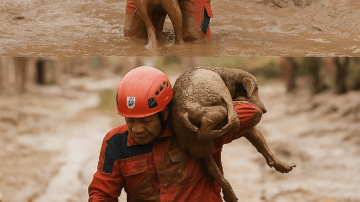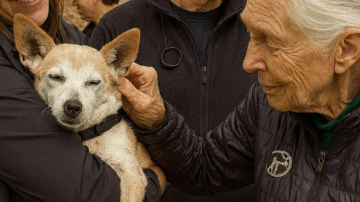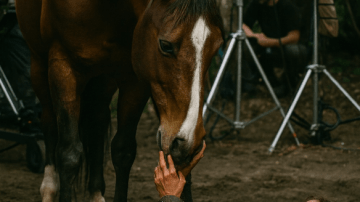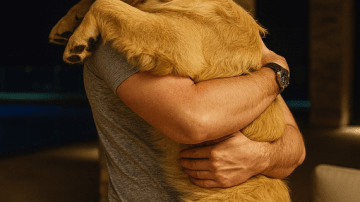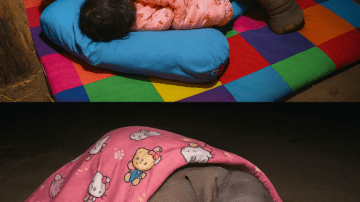He was found wandering the streets, a shadow of what a dog should be. His body trembled, his eyes wet with tears. Every time he saw a passerby, he cried out—loud, desperate, heartbreaking cries that pierced the air. It wasn’t the bark of a dog seeking attention. It was the plea of a soul begging to be noticed, begging not to be forgotten.

When we first received the photographs of him, one detail stood out. Around his neck was an old collar. This wasn’t a stray born on the streets. At some point, someone had called him theirs. He had once belonged.
We rushed to find him.
When we finally saw him, the sight broke us. He was collapsing under the weight of suffering, his body barely holding on. We asked the neighbors if they knew him, if they had ever seen him before. They shook their heads. No one recognized him. He hadn’t been in the area until a few days earlier.
Which meant only one thing: he had been kept locked inside a nearby house, hidden from sight. And when his body could no longer endure, when he became too sick, too frail, too inconvenient, they discarded him—left him to wander, to die.
His condition spoke of long-term neglect. His fur was not just matted—it was woven into ropes, tangled with filth and waste. His skin was riddled with pus-filled wounds and sores from lying in one place for too long. On his nose was a deep wound, likely caused by being pressed against the bars of a cage.
Questions raced through our minds. How long had he been suffering like this? How could someone watch him waste away and do nothing?

But one truth was clear: this innocent soul had endured far too much pain.
We offered him food and water, then let him rest. For the first time in who knows how long, he ate hungrily, his eyes wide with disbelief that the bowl was truly his.
The next morning, we brought him to the clinic. Every test was run. Miraculously, the results for major vector-borne diseases came back negative. Yet not all news was good. His hematocrit was alarmingly low, a sign of severe anemia. The vet suspected something worse—perhaps a tumor. More tests would be needed.
But before that, there was something else we had to do. We had to treat his wounds, shave away the thick mats of hair, and relieve his pain.
We began gently trimming, careful not to cause him more suffering. Hours passed. The tangled ropes of fur fell away, revealing the fragile body underneath. His wounds were cleaned and dressed. He was given his first bath in years, and most importantly, pain relief.

Through it all, he remained calm, patient, almost grateful. Despite his agony, he never snapped, never resisted. It was as if he knew we were trying to help.
We named him Angel. Because in his brokenness, in his suffering, there was still purity, still light.
Angel was an old dog. Too old for us to guess his age with certainty. What we did know was that years of neglect had scarred him deeply.
Further tests revealed the full truth: Angel was suffering from severe anemia, with a hematocrit of only 12. His kidneys were failing—chronic renal insufficiency. This wasn’t something new. It was the result of years without care, years of being denied the most basic needs.
And yet, Angel still had the will to live.
We brought him home to our shelter, determined to give him the best days of his life. Good food, soft bedding, medication, and most of all—love.
The first day in the shelter was quiet. Angel was calm, almost unnervingly so. He ate, he rested, and he slept deeply. For the first time in a very long time, he felt safe.
We gave him vitamins and medicine hidden in his meals. Slowly, his body began to accept the care he had always been denied.
But perhaps the most heartbreaking discovery came not from his bloodwork, not from his wounds, but from his soul.
You could tell Angel had never been touched with kindness. When we stroked his fur, his eyes widened in shock. It was foreign to him, confusing. He didn’t know what a caress meant. He didn’t know that a hand could offer comfort instead of pain.
The look in his eyes told us everything. He had never known love. Never known affection. Never known what it meant to be cherished.
And now, for the first time, he was learning.
Every pat, every gentle rub, every whispered word was something new for him. At first, he flinched. But then, slowly, he leaned into the touch. His eyes softened. He realized—this was safety. This was love.

And with that realization came hope.
Angel had been mistreated his entire life. The scars of neglect were carved into his body and his soul. Seeing him, such an old dog, still so sad—it was almost unbearable.
But we knew one thing: his story would not end in despair.
Day by day, we worked to heal him. Physically, emotionally, spiritually. We made him as comfortable as possible, gave him everything he needed. And with each passing day, Angel grew more at ease.
He no longer trembled when we approached. He no longer cried out in fear. He began to trust, to accept, and to believe.
Angel didn’t deserve the life he had lived. No dog does. But now, in his twilight years, he would finally experience what it meant to be loved.
Piece by piece, moment by moment, we will help him forget the horrors of his past.
For Angel, every caress, every meal, every gentle word is a reminder: you are not worthless. You are not invisible. You are loved.
And from now on, Angel will never again know the sting of rejection, the pain of cruelty, or the loneliness of abandonment. His story is no longer one of suffering. It is one of love, compassion, and second chances.
Because sometimes, even angels need to be saved.

